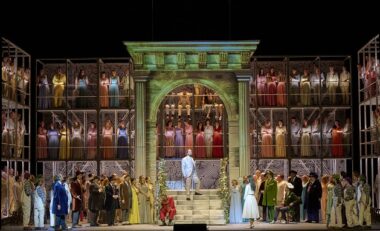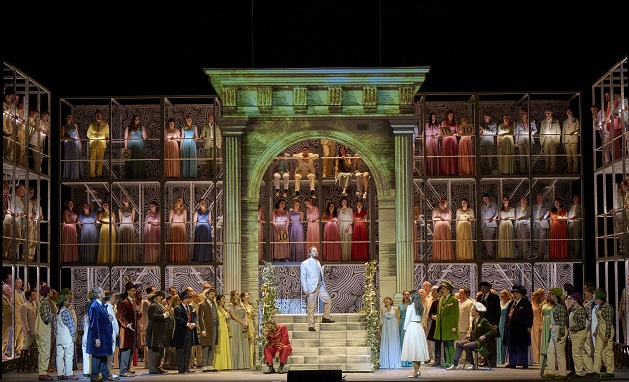 Austria Wagner, Die Meistersinger von Nürnberg: Soloists, Chorus and Orchestra of Vienna State Opera / Philippe Jordan (conductor). Recorded (directed by Ella Gallieni) at Vienna State Opera, 11.12.2022. (JPr)
Austria Wagner, Die Meistersinger von Nürnberg: Soloists, Chorus and Orchestra of Vienna State Opera / Philippe Jordan (conductor). Recorded (directed by Ella Gallieni) at Vienna State Opera, 11.12.2022. (JPr)

Production:
Director – Keith Warner
Set designer – Boris Kudlička
Costume designer – Kaspar Glarner
Lighting designer – John Bishop
Video – Akhila Krishnan
Choreography – Karl Alfred Schreiner
Assistant director -Katharina Kastening
Dramaturgy – Barry Millington
Cast:
Hans Sachs – Michael Volle
Veit Pogner – Georg Zeppenfeld
Sixtus Beckmesser – Wolfgang Koch
Fritz Kothner – Martin Hassler
Walther von Stolzing – David Butt Philip
David – Michael Laurenz
Eva – Hanna-Elisabeth Müller
Magdalene – Christina Bock
The Goblin – Josef Borbely
Kunz Vogelgesang – Joerg Schneider
Konrad Nachtigall – Stefan Astakhov
Balthasar Zorn – Lukas Schmidt
Ulrich Eisslinger – Ted Black
Augustin Moser – Robert Bartneck
Hermann Ortel – Nikita Ivasechko
Hans Schwarz – Dan Paul Dumitrescu
Hans Foltz – Jusung Gabriel Park
Nightwatchman – Peter Kellner
This new Vienna production of Die Meistersinger von Nürnberg from British director Keith Wagner with a British singer making his debut as Walther von Stolzing replaces Otto Schenk and Jürgen Rose’s 1975 version that had 77 performances up until 2012; one of which I saw on a visit to Vienna four decades ago. There have been many different approaches to the opera in recent years, some I have seen – like Barrie Kosky’s at Bayreuth (review here) and some I never did, such as Stefan Herheim’s at the Salzburg Festival. Herheim had, I understand, Hans Sachs dreaming up the whole thing, and this is way Warner also now interprets the story.
In his own words Warner explains the approach as follows: ‘I imagined Sachs’s dream as a creative need, in the sense that he creates a story about his feelings. But I wanted this dreaming to be contagious. That those who get infected and have the necessary talent can create their own worlds, a kind of illusion. Suddenly Sachs begins to immerse himself in Walther’s fantasy, he wanders through his worlds, and conversely Walther can access those of Sachs, Eva also joins them. I like it when the relationship between reality and the inner imagination of the artist or the individual dream becomes fluid. One no longer asks: What exactly is this? We know this from Shakespeare, from Midsummer Night’s Dream, but also from The Tempest and other works, that reality and illusion are very closely interwoven. This is exactly what I have felt for a long time in the music of the Meistersinger. One could show the whole thing exclusively as a dream of Sachs – but the older I get, the less I want to develop a conceptual view that allows only one way, only one interpretation. I like it when there is an ambiguity.’
After the Prelude there is a procession of the ages from figures in sixteenth-century garb through to the present day as Hans Sachs is shown suffering from writer’s block and attempting to write something at the front of stage and frustratedly screwing up his failed attempts. As Warner suggests, what we begin to see is ‘fluid’ as Sachs becomes embroiled in the ‘lives’ of his characters. Various shades of blue and frequently other pastel shades dominate Kaspar Glarner’s costumes beginning with the dungarees of David and the apprentices with their prominent treble clefs. Warner illuminates David’s lecture for Walther on the mastersingers’ rules with several whiteboards across the stage with their animated musical notes. These turn to show cartoons (which will be quickly erased) of the named mastersingers which will be put behind each of them when they come in wearing their regalia and sit in a circle. Intriguingly, Pogner appears to accept a bribe before he introduces Walther to the masters as a candidate to join them and compete for his daughter Eva’s hand in marriage at the song contest. Sachs is shown as an outsider in the company of these fellow mastersingers. When Walther sings the masters turn their chairs as in TV’s The Voice before running away from Walther as if he is has gone mad. However, Sachs obviously finds his approach modern and innovative.
A fantasy figure appeared onstage at the end of the first act and a goblin/leprechaun (as Sachs’s muse?) will pop up again during Warner’s staging. Inspiration for this came from Sachs’s ‘Wahn! Wahn!’ monologue in Act III who refers to the madness at the end of the previous act with the words ‘God knows how that came about? A goblin must have helped.’ Sachs in in his dreamworld and we see dancers twirl through a (early-nineteenth century?) ballet. Then there is a rather bare stage with a single bench and Sachs consoles Eva who is clearly distraught at what is to become of her. Increasingly the railing and angry Sachs reminds me of Tevye in Fiddler of the Roof. He fantasies about Eva in a wedding dress before she arrives onstage. They almost kiss before he explains that is a widower and will not be singing in the contest. The realisation dawns on Sachs that Eva is keen on Walther. Everyone is seething including Walther when he turns up and imagines the masters as fantastical birds. Walther and Eva plan to elope but are caught in the light from Sachs’s house as Eva muses on ‘What trials I have with men!’ Beckmesser’s apprentice trundles on an amplifier connected to an electric lute and Beckmesser gives every impression of an ageing rocker. At the back of the stage is a projection of fifteenth-century Nuremberg (possibly a woodcut by Michael Wolgemut). We have already seen Sachs’s writing desk/tool cabinet and his antics during Beckmesser’s failed wooing of Eva is a bit of a mess with Sachs tossing wooden lasts into a bowl held by the goblin. The act ends with a right rough and tumble of everyone woken up by all the racket. Any buildings we see are mainly just skeletal structures and now there are people on different levels on three sides. Sachs is still orchestrating events as he freezes the fighting at one point. The Nightwatchman comes on as the grim reaper and WAHN is spelled out across the stage.
During the Prelude to Act III, we see Sachs going through memories of his past life as he rummages through in some wooden crates. Walther is now in silvery-white with a pair of braces as he recounts his dream (now within a dream) which Sachs writes down as usual. The bruised and battered Beckmesser enters with eye patch and arm in a sling before Sachs catches him with Walther’s song and straps him to a chair. He is eventually set free and rushes out only to return for David’s girlie magazine which he found earlier in his desk. The melody sung during the quintet is called the ‘Blessed Morning Interpretation Dream Melody’.

Eventually Sachs is left alone with his writing, and we wonder if his haunted dreams are actual memories of his past or perhaps these characters have never existed. We see the cobblers (all in the same aprons we have seen Sachs wear), Jewish tailors and hungry refugees (for the Bakers). He waltzes with Eva and the ghost of his wife. Finally, there is the song contest with the gaily dressed people crowding onto the balconies on every side. There is a central podium with steps leading up to a platform. For the ‘Wach’ auf!’ chorus it opens for Sachs to see the premonition (rather like Scrooge in Dickens’s A Christmas Carol) of his burial next to his wife, Cunigunde. She reappears and poignantly we see the markers for their several children. Hans Sachs in his blue frock coat gives a speech before the one genuinely funny moment in this Die Meistersinger as Beckmesser (dressed as one of Sgt Pepper’s Lonely Hearts Club Band) goes up the steps and falls down the back! The crowd award his song zeros while it is 10s all-round for Walther. He distains the shied he is awarded and places the silver wreath he is proffered on Eva’s head. Sachs storms over and confronts Walther, Eva attempts to crown Sachs with the wreath but it will be passed round a gathering crowd holding up works of great literature or art books in various languages. This comes after Sachs has praised German culture and perhaps are there to convince him not to be so insular.
That is what I saw, as to what I heard it was of course through loudspeakers, but it was dominated by Michael Volle’s Hans Sachs. Volle is in his early sixties but in the vocal form of his life and is one of the most outstanding actor-singers of his generation. Volle sang many phrases with a Lieder-like delivery but is fully capable of the dramatic outbursts Wagner demands and, on top of this, portrayed a totally believable character. There was another fine example of Wagner singing from Georg Zeppenfeld as a noble and resonant-sounding Pogner; Hanna-Elisabeth Müller’s Eva was youthful and endearing; rarely-still, the sweet-toned Michael Laurenz’s David was more ‘theatrical’ than some interpretations; whilst Christina Bock’s attractive and pleasantly sung Magdalene was Eva’s supportive and conspiratorial ‘nurse’ who was far from the ‘old maid’ she is described. Wolfgang Koch (who has himself sang Sachs) was a gruff and grizzled Alberich-like Beckmesser, absolutely perfect for what Warner wanted from him, even though on this night he was having to cope with a slight cough. All the rest of the masters were well-characterised and equally well-sung. David Butt Philip was a strongly lyrical Walther and displayed impressive stamina in singing a rapturous prize-winning song. However, not being in the opera house I wondered if his voice was sufficiently large for the role.
Philippe Jordan will bid farewell to Vienna State Opera at the end of his contract in 2025 and Intendant Bogdan Roščić is abolishing his position of Music Director when he goes. Jordan was resoundingly applauded by the audience after leading the unsurpassed Vienna State Opera Orchestra through a well-rounded performance and proving completely in command of each and every musical facet of Die Meistersinger.
Jim Pritchard
